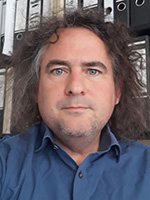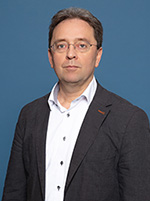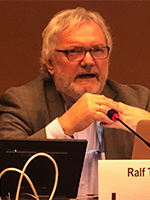Russian allegations of biological weapons activities in Ukraine
Russia has accused Ukraine of working on biological weapons and the United States and Germany of providing support. These allegations are unfounded. There are no indications of such activities, which would be prohibited by the 1972 Biological Weapons Convention (BWC). Germany, the Russian Federation, Ukraine and the United States are BWC states parties. NATO and Western countries have voiced concerns that Russia may use these allegations as pretext to employ chemical weapons in the war against Ukraine.
What is going on and why does it matter?
Information about a variety of biological activities in Ukraine, including those involving cooperation with the USA and Germany, has been publicly available for some time. Considering it in the broader context of the BWC and international biosafety and biosecurity, neither this information nor the arguments put forward by the Russian government so far lend credibility to the notion that these activities are illegal or biological weapons-related. The Russian allegations, on the other hand, tie in with previous false allegations of biological weapons (BW) activities which Moscow levelled against the USA and other states.
Even if false, such allegations are dangerous. They could further escalate the situation, spread fear and terror, or they could prepare the ground for “false flag” operations on the basis of which Russia would accuse Ukraine of having used biological weapons. Therefore, countering and refuting such baseless allegations is important, in particular to support the strong international taboo against biological weapons.
Biological weapons contain microorganisms, such as viruses, bacteria and fungi, or naturally occurring toxins and are employed to inflict disease and potentially death on humans, animals and plants. Their effects are indiscriminate, meaning that they affect civilian and military targets alike, and their use is universally prohibited by international humanitarian and customary law. Such use and, for that matter, the development and possession of biological weapons would constitute a serious violation of international law.
Are the Russian allegations a new development?
Long before starting its war against Ukraine Russia had already accused the United States and Ukraine of maintaining a sophisticated infrastructure for the production of biological weapons on Ukrainian territory. Moscow has even alleged that the United States had used biological weapons. The origins of these false allegations date back to the early Cold War period. During this time the Soviet Union conducted several major disinformation campaigns, accusing the United States of using BW in the Korean War and in Afghanistan, and alleging in the 1980s that the United States had genetically engineered the HIV virus at Fort Detrick, a U.S. biodefense facility.
Russian disinformation campaigns picked up again after the mid-1990s when members of the former Soviet propaganda apparatus re-hashed Cold War disinformation stories. Moscow’s false allegations then focused increasingly on those biological facilities along the Russian periphery that were serving public health purposes and received U.S. government funding. Some of these facilities in Kazakhstan, Georgia and Ukraine had in the past been part of the large and illicit offensive Soviet BW programme.
One key target of Russian propaganda efforts was the Lugar Center in Tbilisi, Georgia. Until 2018, the U.S. Department of Defense had funded the centre through its Defense Threat Reduction Agency, as part of the Cooperative Threat Reduction Program. Independent observers were able to visit the centre in 2018, and fact-checkers have debunked the disinformation campaigns as being based on conspiracy narratives. Even though the Lugar Center’s work is transparent, Moscow continues to level allegations against the Center and its sponsors.
How has the international community reacted to the allegations?
The accused and other countries have strongly rebutted the Russian allegations. On March 11, the UN Security Council, at the request of Russia, debated Moscow’s allegation that Ukraine is working on biological weapons. The UN High Representative for Disarmament Affairs, Izimu Nakamitsu, commented on the Russian allegations by stating that the “United Nations is not aware of any biological weapons programmes”. In the meeting, Western states unequivocally rejected Russia’s allegations, as did a number of other states.
China has echoed Russian concerns about U.S. biosecurity facilities but has stopped short of alleging that these are involved in offensive biological activities. Thus, the Chinese Ministry of Foreign Affairs on March 8 raised questions about the nature of work conducted at 336 biosecurity facilities in 30 countries cooperating with the U.S. Department of Defense on biosecurity.
Is there a basis for the allegations?
As is common in disinformation campaigns, Russia mixes facts that can be corroborated with insinuations or assertions for which there is no factual basis. There are biological laboratories in Ukraine that receive support from U.S. and German government sources. There is also work with dangerous pathogens in Ukraine. However, biological research does not equal biological weapons research, even if it does involve dangerous pathogens, and work for peaceful and prophylactic purposes is explicitly allowed under the BWC. Several pathogens, such as those causing anthrax, tularemia, or Crimean-Congo hemorrhagic fever, occur naturally in Ukraine. Research with these pathogens is important to realise public health objectives such as the early detection of disease outbreaks or the development of vaccines and drugs, and does not per se imply the development of biological weapons. Russia has alleged that Ukrainian “emergency clean-up” operations to prevent dangerous pathogens from falling into Russian hands were indicative of illegal activities. However, Ukraine would be acting irresponsibly if it left such pathogens in place and risked losing control over them or having them released into the open as a result of military attacks.
Russia is exploiting the complex nature of biological research and biotechnology for its disinformation purposes. Biology and biotechnology often include dual-use research which pursues legitimate objectives but could be misread as having illegitimate intentions. Such work could also be misused for criminal, bioterrorist or weapons purposes. A high degree of transparency in biological research activities is thus crucial to avoid misperceptions. High standards of biosafety and biosecurity, awareness of dual-use potentials and measures to mitigate the ensuing risks are important to minimise the consequences of accidental or intentional disease outbreaks.
The United States and Germany cooperate with Ukraine on a range of peaceful biosafety and security projects. U.S. activities date back to the early 1990s, when Washington and Moscow initiated the Cooperative Threat Reduction (CTR) Program after the 1991 collapse of the Soviet Union. Under the CTR Program, Washington and Moscow initially worked together to prevent the proliferation of weapons, knowledge and materials from the former Soviet nuclear, biological and chemical weapons-related facilities, several of which were located in the newly independent states. Ukraine and the United States concluded a follow-on threat reduction agreement in 2005. The G8 (which then included Russia) pledged US$20bn in 2002 to prevent catastrophic terrorism and the proliferation of weapons of mass destruction. In 2013, Germany established its Biosecurity Programme, which also includes cooperation with Ukraine, in the framework of the G8/G7 Global Partnership Against the Spread of Weapons of Mass Destruction.
While these measures are primarily aimed at enhancing public health capacities and preventing bioterrorism, they also help achieve the objectives of the BWC, where states parties have agreed to submit annual Confidence-Building Measures (CBMs) to enhance transparency about their biological research. Declaration requirements include details on research activities and facilities related to biological defence activities or to vaccine production, and those facilities that have maximum or high biological containment levels. Germany, Russia, Ukraine and the United States have all participated in the CBM exchange on a regular basis. With the exception of Russia, they have voluntarily made their CBM declarations publicly available, while Moscow has shared its CBM declarations with BWC states parties only. In its most recent CBM declaration submitted in 2021, Ukraine lists details for nine state-funded research laboratories or centres and 95 laboratories that are at a level of safety for working with microorganisms that are not considered to have biological weapons potential (BSL-2). Additionally, Kyiv declared that it had no biological defence activities and no maximum containment laboratories (which would be well-suited for weapons-related research).
The presence of biological research in Ukraine and foreign support for such activities is thus no secret. These activities are conducted in a transparent way, with legitimate purposes, and in line with the international norms against biological weapons.
Why does it matter and what can be done?
NATO Secretary General Jens Stoltenberg has warned that Russia’s claim of Ukraine having biological weapons could be used as a pretext for Russian chemical weapons attacks. After all, Syria’s use of chemical weapons as a weapon of terror has been militarily effective to break the resistance of anti-Assad forces. Russia has supported the Assad government despite the latter’s repeated violation of the CWC and has been plausibly accused of having used chemical warfare agents (novichoks) for attempted assassinations.
In contrast, the military utility of biological weapons is limited, particularly in close combat as is happening in Ukraine. The effects of biological weapons are delayed and difficult to contain in space and time. It would thus make no sense for Ukraine to develop biological weapons, especially considering the high political costs associated with such a severe norm violation. At the same time, biological weapons attacks can be difficult to attribute, making them ideal for false flag operations.
Generally speaking, false allegations of development, possession and use of weapons of mass destruction can create perceptions that the taboos against biological, chemical and nuclear weapons no longer hold. If unanswered, allegations can linger and take on a life of their own. For example, Russia’s accusations have been picked up by right wing conspiracy groups. The long-term effects of Russia’s allegations to a large degree depend on the reactions by the international community. Even if it should be impossible to disprove some allegations because of their vagueness, a swift, strong and unified rejection by other states can send a powerful signal that Russia’s allegations are unfounded.
It is easy for Russia to muddy the waters on biological weapons because only limited means exist to clarify such allegations. The CWC provides several instruments for investigations of alleged chemical weapons use or other cases of non-compliance. These instruments have proven useful in Syria and could be employed in Ukraine, too, should the need arise. But the war situation and the likely lack of Russian cooperation would complicate the process. The BWC has no such inspection or verification capacity. If Russia really had serious concerns about U.S. or Ukrainian non-compliance with the BWC, it could still try to resolve the issue in the BWC framework. In particularly grave cases of suspected or proven non-compliance, BWC states parties can request the UN Security Council to address the matter pursuant to BWC Article VI. States parties can also use the consultation provisions contained in BWC Article V to address “any problems which may arise in relation to the objectives of, or in the application of the provisions of, the Convention”. Russia could thus use this provision to clarify its alleged concerns, and the United States or Ukraine could initiate a consultation process.
In case of an alleged use of biological weapons in Ukraine, the UN Secretary General could also activate the mechanism to investigate the alleged use of chemical and biological weapons (UNSGM). The UNSC established the mechanism in the 1980s. It was last used in 2013 to investigate alleged chemical attacks in Syria, including the major sarin attack in Ghouta, Damascus. It is available to all UN members and could be triggered at the request of any member state. Investigations in an ongoing war situation would of course be extremely challenging, but the Syrian example proved that they are feasible.
It is telling that Russia chose not to pursue any of the diplomatic paths to establish the facts on the ground. While there is no credible information that would support Moscow’s allegations of biological weapons activities in Ukraine, there is a wealth of information available that suggests the allegations are unfounded. However, the mere possibility that biological or chemical weapons can play a role as propaganda material, false flags, or in actual attacks, adds a new dimension to the war. This underlines the long-term need for strengthening the international norms and instruments against chemical and biological weapons. In the short-term, the most important measure to uphold the BWC is to call out Russian disinformation and to send clear and consistent warnings to Russia about the dire consequences of any use of weapons of mass destruction.
Reihen
Ähnliche Beiträge
Schlagwörter
Autor*in(nen)

Una Jakob

Latest posts by Una Jakob (see all)
- Chemical Weapons Disarmament in Syria – A Door Opening? - 14. März 2025
- The 9th Review Conference of the Biological Weapons Convention - 7. Februar 2023
- Russian allegations of biological weapons activities in Ukraine - 22. März 2022

Gunnar Jeremias

Latest posts by Gunnar Jeremias (see all)
- Russian allegations of biological weapons activities in Ukraine - 22. März 2022
Alexander Kelle
Latest posts by Alexander Kelle (see all)
- Russian allegations of biological weapons activities in Ukraine - 22. März 2022

Thilo Marauhn

Latest posts by Thilo Marauhn (see all)
- Politisierung in Zeiten schwacher politischer Normen: Zum Klima-Gutachten des Internationalen Seegerichtshofs - 18. Juni 2024
- Russian allegations of biological weapons activities in Ukraine - 22. März 2022
- Sicherheitspolitische Zeitenwende: Welche Fähigkeiten braucht Deutschland, um den Frieden zu sichern? - 11. März 2022

Oliver Meier

Latest posts by Oliver Meier (see all)
- Russian allegations of biological weapons activities in Ukraine - 22. März 2022

Kathryn Nixdorff

Latest posts by Kathryn Nixdorff (see all)
- Russian allegations of biological weapons activities in Ukraine - 22. März 2022

Ralf Trapp

Latest posts by Ralf Trapp (see all)
- Russian allegations of biological weapons activities in Ukraine - 22. März 2022

Barry de Vries
